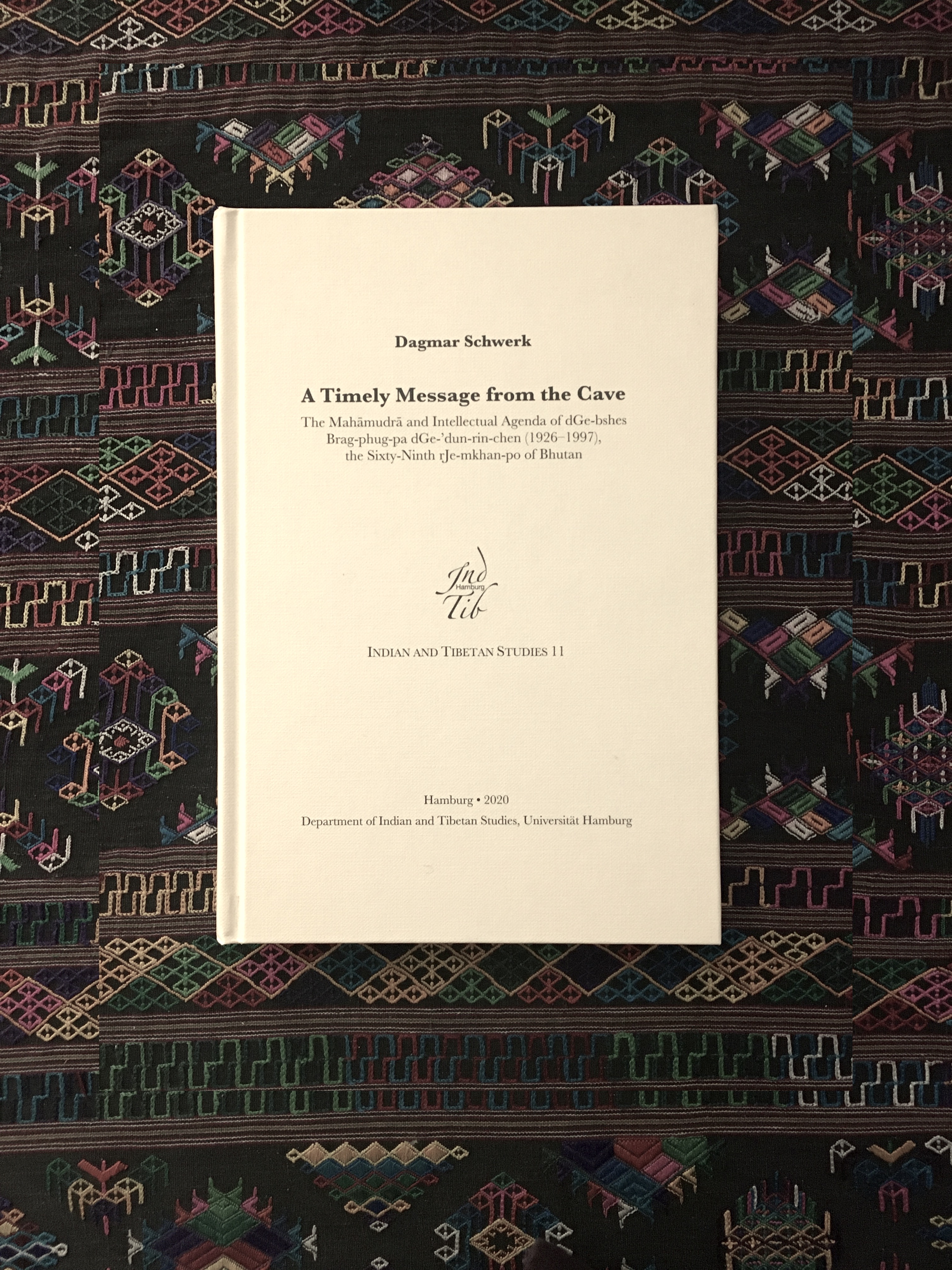
Dr. Dagmar Schwerk
Khyentse Foundation Postdoctoral Fellow in Tibetan Buddhist Studies, University of British Columbia
Tibetan Buddhism, modernity and religion, Himalayas, Bhutan, Buddhist ethics, secularity, religion and politics in Bhutan, Tibet, Buddhist philosophy, nation building, identity building
Media
Inspiration in Isolation – Dagmar Schwerk
UBC Department of Asia StudiesOnline
URL: https://asia.ubc.ca/news/inspiration-in-isolation-dagmar-schwerk/
[BLOG] RELIGION AND POLITICS IN BHUTAN: AN INTERVIEW WITH DAGMAR SCHWERK

Dagmar Schwerk, A Timely Message from the Cave: The Mahāmudrā and Intellectual Agenda of dGe-bshes Bragphug- pa dGe-’dun-rin-chen (1926–1997), the Sixty-Ninth rJe-mkhan-po of Bhutan
by Dagmar Schwerk
Indian and Tibetan Studies Series, Universität Hamburg
December 31, 2020
ISBN: 978-3-945151-10-5
A Timely Message from the Cave addresses the longlasting
debate about the Mahāmudrā doctrine and
meditative system that was first elicited through Sakya
Paṇḍita (1182–1252)'s systematic critique in the thirteenth
century. For the first time, the positions of eminent
Bhutanese Drukpa Kagyü masters between the eighteenth
and twentieth centuries are made accessible to the
English-speaking reader. The Tibetan text corpus deals
with the entire spectrum of the crucial controversial topics
about the Mahāmudrā doctrine and meditative system.
Some of those topics were discussed over centuries,
partially reaching back to earlier philosophical disputes in
India. Furthermore, this Tibetan text corpus shows how oral
discourses formed into new elite Buddhist textual traditions
addressing the Mahāmudrā doctrine and meditative system
and gained trans-regional and trans-cultural relevance
among both Tibetan and Bhutanese Buddhist masters in the
eighteenth century. A Timely Message from the Cave
includes a critical edition as an editio princeps, a richly
annotated translation, and a comprehensive analysis of the
Sixty-ninth Chief Abbot of Bhutan Geshe Drapukpa Gendün
Rinchen (1926–1997)'s dense Mahāmudrā commentary in
verse, the Timely Messenger, comprising the Ninth Chief
Abbot of Bhutan Shākya Rinchen (1710–1759)'s root text, the
Pointed Spear of a Siddha.
The Sixty-ninth Chief Abbot of Bhutan Geshe Drapukpa
Gendün Rinchen was one of the most influential Bhutanese
Buddhist masters of the twentieth century. He significantly
contributed as an author, scholar, teacher, and
practitioner to doctrinal innovations and the modernization
of religious, educational institutions of the Drukpa Kagyü
school in Bhutan in the second half of the twentieth
century. A Timely Message from the Cave also explores his
life and vast literary and scholastic heritage based on
classical Tibetan biographical and autobiographical
accounts and his collected works in ten volumes.
Biography
Dr. Dagmar Schwerk is a scholar of premodern and modern Tibetan and Himalayan Buddhism; in particular, Bhutan’s intellectual, political, and social history between the seventeenth and twentieth centuries. She specifically address topics such as the formation of Buddhist doctrinal agendas, trans-regional knowledge and literary production, the relation between the societal spheres of religion and politics, identity- and nation-building processes, secularities and modernity, and engaged Buddhist ethics. She is the current Khyentse Foundation Postdoctoral Fellow in Tibetan Buddhist Studies at the University of British Columbia and a research associate at the University of Leipzig's Centre for Advanced Studies in the Humanities and Social Sciences “Multiple Secularities: Beyond the West, Beyond Modernities." Now holding a PhD in Tibetan Studies and an MA in Tibetology, classical Indology, and political science from the University of Hamburg, Schwerk was the recipient of several prestigious fellowships and awards, such the Khyentse Foundation Award for Excellence in Buddhist Studies in 2012, the 2016 Dissertation Fellow of The Robert H. N. Ho Family Foundation Program in Buddhist Studies, and the German Academic Scholarship Foundation (Studienstiftung des deutschen Volkes).
